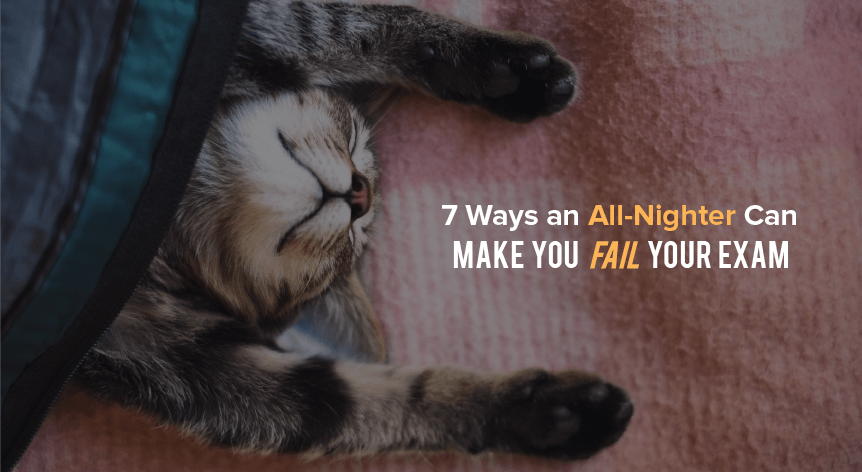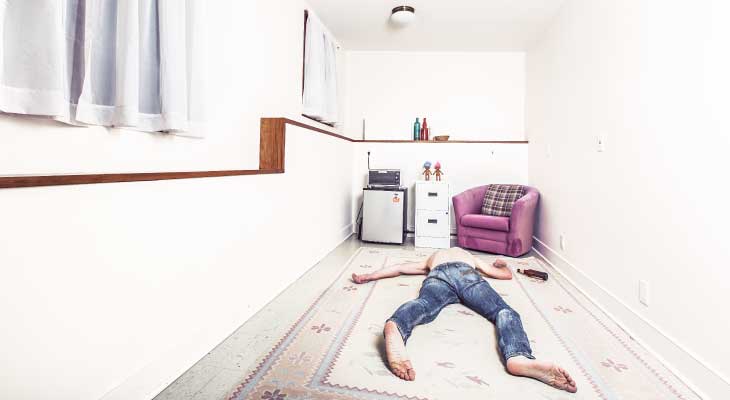7 Ways Pulling an All-Nighter Could Make You Fail Your Exam
Staying up late cramming? Your grades might suffer for it! Contrary to popular belief, here’s why the idea of staying up late will kill your brain’s ability to ace that paper.
Updated 05 Mar 2019

It’s three hours until the crack of dawn, and every passing moment means your next exam is inching closer. Reaching for that fifth cup of Americano, your hand starts to tremble. But sleeping isn’t an option.
Sound familiar? That’s right – this all-nighter-scenario is (unfortunately) a quintessential rite of passage for students everywhere!
We’re all aware of the numbers – seven to eight hours of sleep for an adult and ten hours for teenagers – but sometimes, we have no choice but to load up on caffeine and buckle up for a sleepless night.
Although staying up late may seem like the only harmless way to go, the short-term and long-term effects can stretch beyond the dreaded dark circles underneath our eyes.
Here are seven startling (and serious) repercussions how pulling an all-nighter could end up doing more harm than good – physically, emotionally as well as your knack to learn – and why you should avoid them at all costs!
#1. You’ll struggle to remember what you read

Tracing back to our kiasu Asian roots, we’ve grown to embrace the thinking that, “more time = higher probability of regurgitating knowing the material inside and out”. While this holy grail works wonders in many aspects of our life, it backfires when it comes to an all-nighter of cramming session.
In fact, staying up later might actually mean learning less.
That’s because sleeping plays a critical role in the formation of new memories. While you sleep, your brain is hard at work consolidating, storing and strengthening memories. Scientifically speaking, a part of your brain called the hippocampus replays what you’ve picked up while you were awake and magically encodes what you’ve learned into your long-term memory during bedtime.
PRO TIP
If you insist on reading straight through the night, your brain does not get a chance to convert your short-term memories into long-term memories. So if you want to spit out a bunch of facts during the exam, you’re going to have to revise and then sleep on it!
#2. You’ll remain stuck on any complicated problems

So you’ve made a pledge to remain stationary at the same spot until you can crack that difficult math puzzle you’ve been working on for the last four hours. While we bow down to your ungodly perseverance, the wise thing to do would be to hit the sack and give it a go again the morning.
Why? Because science says so. During REM sleep, your brain integrates new memories with other memories you’ve previously learned. Biologically speaking, your brain churns out new insights during deep sleep that aids you in recognising patterns and solving problems without even consciously thinking about it.
PRO TIP
When you pull an all-nighter, you also miss out on that sweet, sweet subconscious insight that can be valuable in solving particularly complex problems.
#3. You’ll feel like a walking zombie

Okay, this one is a no-brainer. When you stay up until the wee hours, it’s an open invitation for your body clock to go out for a wack – as a result you’re snacking when you should be resting, seeing light when you shouldn’t be (#edwardcullen) and acting totally out of sync.
Every tiny cell in your body packs its own circadian clock and fires signals to your brain, keeping them in top shape to make sure your meal and sleep times are running harmoniously. But when you flush your circadian rhythm down the drain by not getting quality slumber, symptoms such as a vague sense of nausea, fatigue and sleepiness will start to haunt you.
PRO TIP
Everyone’s circadian rhythms is different; if you’re a night person, you’ll probably spend the first five hours at the library at snail pace, and the last five hours laser focused. Pin down whether you are a morning person or a night person – in terms of your capacity to crack problems and absorb new information – and schedule your studies around this discovery!

#4. You’ll turn into a snack monster

Let us guess: sometime towards the pink flash of dawn, when you finally decide to put down the textbook, you were tempted by your inner voice for cheese puffs even though there are only two hours to go until breakfast. If that sounds familiar, then you should know the repercussions that slip beneath it.
When you don’t sleep, your body releases more ghrelin – yes, the hunger hormone that orders you to eat. But that’s not all! It also doesn’t produce enough leptin, the hormone that gently reminds you it’s probably time to stop eating. Hence, you experience an insatiable hunger after a sleepless reading binge because your body loses its ability to tell when you are full.
Now with the lack of sleep, the ratio of these hormones goes topsy-turvy and your metabolism goes bonkers. As a result, the odds of you expanding sideways will also be doubled (#worstnightmare).
PRO TIP
Under dire circumstances to satiate your hunger, turn to these brain foods instead!
Apply for university with EduAdvisor
Secure scholarships and more when you apply to any of our 100+ partner universities.
Start now#5. You’ll make questionable decisions

When you wrapped up that reproduction chapter from your Biology textbook at 4.30 AM, did you feel the impulse to text your ex? Yeah. That’s because a lack of sleep generally tarnishes your ability to make sound decisions. Your exhausted, confused brain is merely trying to keep you going, so it drugs you with natural painkiller.
We all know the short-term euphoria that hits when we deprive ourselves from sleep, but that’s not strictly a good thing. The slaphappy feeling of dopamine gets in the way with our brain’s ability to plan logically, sometimes even winding up in unpredictable behaviour and an increased willingness to take risks.
The payoff? You feel all chill and loopy while being more susceptible to making terrible decisions (like cramming all night believing you know the material, when in reality it worsens your memory retention)!
#6. You’ll be on an emotional rollercoaster

We get it: exams and pop tests are already panic-inducing enough, but if you’re throwing in an all-nighter to get ready for the big day, you can forget about being upbeat and peppy in the morning. Why? Because a lack of sleep makes you more prone to an emotional breakdown.
For starters, sleepless nights tend to lead to a lack of emotional stability. In fact, researchers from University of Pennsylvania found that participants who logged four and a half hours of sleep per night for a week reported feeling more stressed, angry, sad and less able to regulate their emotions than usual. Nonetheless, when they reverted back to their normal sleeping pattern, their moods returned to baseline too.
PRO TIP
If you often prioritise books over sleep, you could be setting up yourself for deeper drawbacks. Research reveals that chronic insomnia can elevate the risk of depression, anxiety and panic disorder by as much as fivefold.

#7. You’ll have a harder time thinking on your feet

Need to be on the ball and think sharp tomorrow? Then hit the sack early. When you’re deprived of sleep, your brain’s ability to make split-second decisions will be jeopardised. Imagine this: your brain consumes a lot of energy during the day (#ifyouareusingit), and by bed time, it’s packed with metabolic waste.
Our brain usually spends the night diligently detoxing and getting rid of this waste while we doze off but when we selfishly force our brain to go with us on a magical journey through mountain of textbooks, we hold it back from repairing and restoring its neurons as well as cells.
Sceptical? You shouldn’t be. The geniuses at University of Texas pitted sleep-deprived cadets against well-rested ones by having both groups perform identical tasks that required fast-decision making. Not surprisingly, the cadets who passed up on sleep completed the tasks with 6% less accuracy compared to those who caught enough sleep.
From memory to mood (and even to your appearance and weight), there are all the reasons in the world to give up on all-nighters and very few to make them a habit. So let’s stop donning our all-nighters like badges of honour.
Still keen on acing that test tomorrow? Take it from us: put down the scrolls of texts and hit the sack.






